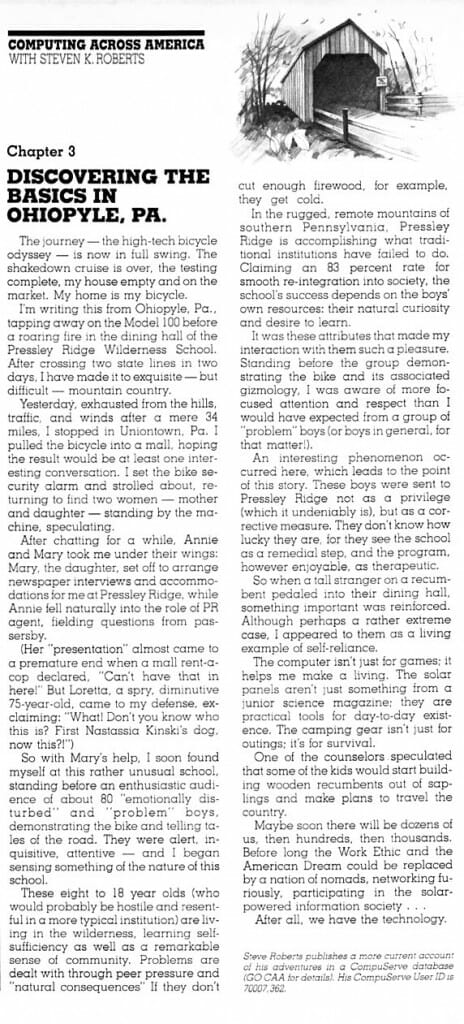
Discovering the Basics in Ohiopyle
The adventure was starting to unfold, and my monthly narratives from the road were published in CompuServe’s magazine (as well as more frequently, in the CAA area online) Many, like this one, were later fleshed out as book chapters.
by Steven K. Roberts
Online Today magazine
January, 1984
The journey — the high-tech bicycle odyssey — is now in full swing. The shakedown cruise is over, the testing complete, my house empty and on the market. My home is my bicycle.
I’m writing this from Ohiopyle, Pa., tapping away on the Model 100 before a roaring fire in the dining hall of the Pressley Ridge Wilderness School. After crossing two state lines in two days, I have made it to exquisite — but difficult — mountain country.
Yesterday, exhausted from the hills, traffic, and winds after a mere 34 miles, I stopped in Uniontown, Pa. I pulled the bicycle into a mall, hoping the result would be at least one interesting conversation. I set the bike security alarm and strolled about, returning to find two women — mother and daughter — standing by the machine, speculating.
After chatting for a while, Annie and Mary took me under their wings: Mary, the daughter, set off to arrange newspaper interviews and accommodations for me at Pressley Ridge, while Annie fell naturally into the role of PR agent, fielding questions from passersby.
(Her “presentation” almost came to a premature end when a mall rent-a-cop declared, “Can’t have that in here!” But Loretta, a spry, diminutive 75-year-old, came to my defense, exclaiming: “What! Don’t you know who this is? First Nastassia Kinski’s dog, now this?!”)
So with Mary’s help, I soon found myself at this rather unusual school, standing before an enthusiastic audience of about 80 “emotionally disturbed” and “problem” boys, demonstrating the bike and telling tales of the road. They were alert, inquisitive, attentive — and I began sensing something of the nature of this school.
These eight to 18 year olds (who would probably be hostile and resentful in a more typical institution) are living in the wilderness, learning self-sufficiency as well as a remarkable sense of community. Problems are dealt with through peer pressure and “natural consequences.” If they don’t cut enough firewood, for example, they get cold.
In the rugged, remote mountains of southern Pennsylvania, Pressley Ridge is accomplishing what traditional institutions have failed to do. Claiming an 83 percent rate for smooth re-integration into society, the school’s success depends on the boys’ own resources: their natural curiosity and desire to learn.
It was these attributes that made my interaction with them such a pleasure. Standing before the group demonstrating the bike and its associated gizmology, I was aware of more focused attention and respect than I would have expected from a group of “problem” boys (or boys in general, for that matter!).
An interesting phenomenon occurred here, which leads to the point of this story. These boys were sent to Pressley Ridge not as a privilege (which it undeniably is), but as a corrective measure. They don’t know how lucky they are, for they see the school as a remedial step, and the program, however enjoyable, as therapeutic.
So when a tall stranger on a recumbent pedaled into their dining hall, something important was reinforced. Although perhaps a rather extreme case, I appeared to them as a living example of self-reliance.
The computer isn’t just for games; it helps me make a living. The solar panels aren’t just something from a junior science magazine; they are practical tools for day-to-day existence. The camping gear isn’t just for outings; it’s for survival.
One of the counselors speculated that some of the kids would start building wooden recumbents out of saplings and make plans to travel the country.
Maybe soon there will be dozens of us, then hundreds, then thousands. Before long the Work Ethic and the American Dream could be replaced by a nation of nomads, networking furiously, participating in the solar-powered information society . . .
After all, we have the technology.

